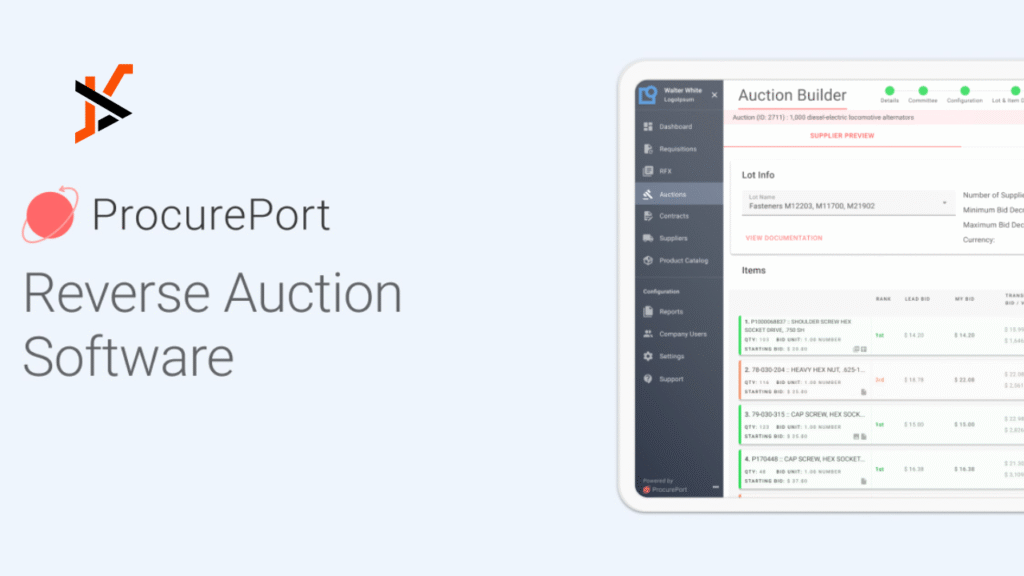In today’s digital procurement landscape, companies are moving away from legacy negotiation methods to smarter, faster, and more competitive options. An example of such an innovation is Reverse Auction Software, which has changed the sourcing strategies. This tool can aid procurement managers, business owners, or members of strategic sourcing teams with optimizing purchasing decisions, reducing costs, and fostering supplier competition.
We will now discuss the workings of this technology, its advantages, and how to select the most appropriate reverse auction software for your company.
What is Reverse Auction Software?
Reverse Auction Software is a system where sellers are invited to competitively bid by offering the lowest quote for posted requirements. Bid prices in reverse auctions tendered online typically fall, unlike traditional auctions, where prices rise. This type of auction is common in procurement, supply chain management, and e-commerce to get the lowest prices for certain goods or services.
Vendors participating in the auction as buyers experience a predictable, time-bound system where multiple suppliers compete to submit their bids. With real-time bidding, the software evaluates the bids based on preset criteria, including cost, and ranks them. The buyer can make a fast, smart decision.
Primary Attributes of Reverse Auction Software
As you consider reverse auction software, here are the key features to ensure you are selecting the best option:
- Real-time Bidding Dashboard: Provides live updates of vendor bids during the auction.
- Automated Bid Ranking: Highlights winning proposals in an ordered list for easier decision making.
- Supplier Management Tools: Streamlines the onboarding and communication processes with vendors, as well as compliance.
- Customizable Auction Settings: Accommodates various auction types, including time limits, minimum bid increments, and other rules.
- Reporting & Analytics: Provides data on savings achieved, supplier participation, and the bidding activity for informed future planning.
All these features enhance automation in the auction and foster greater supplier competition, which makes participation equitable.
Benefits of Using Auction Software in Procurement
The advantages of auction software begin with specialized platforms for reverse auctions, and are as follows:
- Reduction in Costs: Increased competition often lowers the price of goods and services offered by suppliers.
- Efficiency in Time: The entire negotiation process is expedited with online auction platforms.
- Greater Openness: Defined guidelines, along with real-time access to proceedings, increase trust and reduce bias.
- Enhanced Engagement From Suppliers: Supplier participation is heightened as they know that chances are equal and available to all.
- Evidence-Based Decisions: Advanced analytics and integrated systems enable smarter sourcing decisions.
These benefits enable companies to enhance strategic sourcing significantly.
Industries That Enjoy the Benefits Of Reverse Auction Software
Reverse auction software is mostly known in the logistics and procurement sectors, but its use has spread to several industries as a productivity booster. These industries are:
- Manufacturing: Used in obtaining components and raw materials.
- Retail and E-commerce: Used in acquiring products and selecting vendors.
- Construction: Subcontractors and material bidding.
- Healthcare: Involved in procuring equipment and pharmaceuticals.
- Government Agencies: Used for accountable and transparent vendor selection.
No matter the industry, using the right auction software can provide a business advantage.
How To Pick The Best Reverse Auction Software?
Choosing the right tool depends on your organization’s requirements, and here are some tips:
- Assess User Experience: Look for auction management software that is easy to navigate for both buyers and suppliers.
- Business Scalability: The software should accommodate the business and multiple auction events in the future.
- Legal Compliance on Security: Choose a reverse auction software that offers protection for sensitive data.
- Integration Capabilities: Check whether the auction software is compatible with your ERP or procurement systems.
- Support and Training: Select auction solution vendors that offer training and customer support after the implementation phase.
Use different demos and trial options to compare auction solutions to find the software that will achieve your business objectives.
Why Reverse Auction Software is a Smart Investment?
Every business requires tools that ensure efficiency, transparency, and lower expenses in digital procurement. The utilization of reverse auction software helps to ensure that all these goals are achieved with ease. This software not only ensures the maintenance of strong supplier relations for the company, but it also ensures better negotiation and smooth sourcing.
Apart from the strategic advantage in gaining a competitive edge in the supply chain of the company, reverse auction software allows for great savings on costs. Focusing on eliminating outdated RFQs and embracing modern sourcing will benefit all businesses.
FAQ’s
Q1: Compare and contrast the features of reverse auction and traditional auction software.
A: In traditional auction software, the bidding price of a product goes up as people join to compete for the item. On the other hand, with the reverse auction software, the price is lowered as suppliers beat each other to get the chance to do business with the buyer.
Q2: Does reverse auction software work for small-sized companies?
A: Indeed, many companies providing software solutions have focused on small to medium-sized enterprises. Therefore, a lot of procurement software platforms have focused on saving costs, giving small businesses the opportunity to expand.
Q3: How secure is reverse auction software?
A: To maintain the secrecy of the transaction and bids, some modern platforms have provided measures to ensure that all data and communications are well protected, preventing outside access, ensuring encryption, and protecting the information in an unexposed state. Most platforms do follow these standards.
Q4: Are all enterprise systems reverse auction compatible?
A: Leading suppliers of software solutions and other well-known systems provide functionality to interact freely with other programs and offer compatibility for purchases made freely from other systems.
Q5: What are the feelings of suppliers regarding participation in reverse auctions?
A: Although it can be fierce, suppliers generally value the openness and fairness of having a chance to compete for work based on their actual capabilities.

